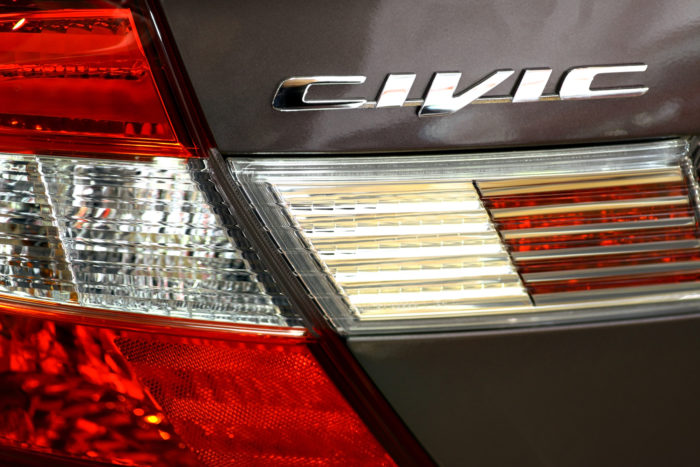Top Class Actions’s website and social media posts use affiliate links. If you make a purchase using such links, we may receive a commission, but it will not result in any additional charges to you. Please review our Affiliate Link Disclosure for more information.

The Honda Civic class action claims that in some cases the defect causes drivers to exit the car when it isn’t properly parked, and can result in the vehicle rolling away.
Plaintiffs Sheryl Tenzyk and Larry Allen say they both leased Honda Civics, and experienced the parking rollaway defect.
Tenzyk reportedly leased a 2016 Honda Civic hatchback from Apple Honda in Riverhead, N.Y. in March 2016. Allen says he leased a 2017 Honda Civic hatchback from Della Honda in Plattsburg, N.Y. in February 2017.
According to the two plaintiffs, the 2016, 2017, and 2018 Honda Civics do not notify users if the vehicles are out of gear when a user attempts to park them.
The Honda Civic class action claims that the vehicles also fail to automatically activate electric parking brakes in certain situations, like when a driver exits the vehicle or when a driver’s door is open. In these instances, the vehicles reportedly rollaway when they should be parked.
The two plaintiffs say the gear shifters in the vehicles rely solely on visual feedback to convey gear selection and to put the vehicle in park.
Allegedly, this is dangerous and ineffective because when the vehicles rollaway, they can cause crashes and injuries.
The Honda class action lawsuit claims that Honda knew of the defect but failed to disclose it and continued to sell the vehicles nonetheless.
According to Tenzyk, she researched possible vehicles before deciding to lease the 2016 Honda Civic. She says that she chose the vehicle because she believed that it would be safe and effective, because of its advertised safety features.
The Honda Civic class action claims that Honda knew of the parking defect when Tenzyk leased the vehicle, but did not disclose the defect or the risks associated with it to her.
Allegedly, Honda misled her into believing that she was receiving a safe and effective vehicle.
Tenzyk claims that in November 2017, she turned on her vehicle in her driveway before running errands. She says that the car was in park before she briefly went into the house.
The plaintiff alleges that when she returned to the car, she saw that the vehicle had rolled down her driveway and across the street and into her neighbor’s yard.
Reportedly, the vehicle hit a cable poll and damaged the front of the bumper. She says that she took it to a body shop a couple of days later, and had to pay around $700 in repairs.
The Honda class action says Tenzyk experienced a similar incident again in May 2018, when she parked her vehicle by her gym. She claims that she returned from the gym to find that the vehicle had run into a handicapped spot behind the space she had parked in.
According to the Honda parking defect class action lawsuit, Tenzyk then contacted Honda and reported the two incidents.
Allegedly, the Honda representative assigned to her case never contacted her. She says that the agent then sent her a letter closing her case.
Tenzyk claims that she continued to attempt to contact the Honda dealer, but was told by a technician that “nothing was wrong with her vehicle,” and that the problems she had experienced were most likely the result of “user error.”
Allen says that like Tenzyk, he decided to lease his Honda Civic after research into the safety features of the vehicle. He also claims that when he leased his vehicle, Honda knew of the defect but did not warn him of it.
The Honda Civic defect class action states that Allen parked his vehicle at a restaurant on a slight downhill, and when he was in the restaurant, the vehicle rolled down the parking lot and crashed into a truck. Allegedly, he had to pay more than $1,000 for repairs to the damage done in the collision.
Both Tenzyk and Allen say that they were financially injured by the defect because had they known of the defect, they would not have leased the Honda Civics or would not have paid as much for them.
Additionally, they say that they were financially injured by the defect because the it caused their vehicles to be part of a collision, and they were forced to pay for repairs to the damages.
The Honda Civic Rollaway Defect Class Action Lawsuit is Sheryl Tenzyk, et al. v. American Honda Motor Co. Inc., et al., Case No. 2:18-cv-06121, in the U.S. District Court for the Eastern District of New York.
If you own or lease a Honda civic that rolled away while in park, you may qualify to file a Honda Civic rollaway class action lawsuit. Join this Honda Civic lawsuit investigation by filling out the FREE form on this page.
ATTORNEY ADVERTISING
Top Class Actions is a Proud Member of the American Bar Association
LEGAL INFORMATION IS NOT LEGAL ADVICE
Top Class Actions Legal Statement
©2008 – 2024 Top Class Actions® LLC
Various Trademarks held by their respective owners
This website is not intended for viewing or usage by European Union citizens.
Get Help – It’s Free
Join a Free Honda Civic Class Action Lawsuit Investigation
If you qualify, an attorney will contact you to discuss the details of your potential case at no charge to you.
PLEASE NOTE: If you want to participate in this investigation, it is imperative that you reply to the law firm if they call or email you. Failing to do so may result in you not getting signed up as a client or getting you dropped as a client.
Oops! We could not locate your form.












